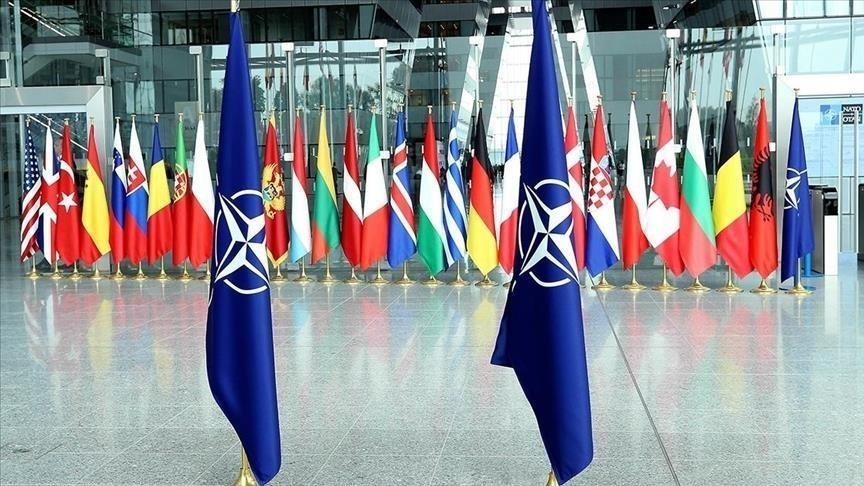
ANKARA
As NATO allies gathered for a summit in Brussels this week, the key role that Turkey plays in the alliance is again in the spotlight, amid continuing security concerns in Syria and Turkey's wider region.
Since becoming a NATO member in 1952 (just three years after its formation), Turkey has been one of the alliance's biggest contributing partners, making its abilities and capabilities an integral part of the command and force structure of the alliance, with its second-largest army.
The North Atlantic Treaty Organization (NATO), founded on April 4, 1949, currently has 30 members and is headquartered in Brussels.
In 1952, to its 12 founding countries of Belgium, Canada, Denmark, France, Britain, Iceland, Italy, Luxembourg, the Netherlands, Norway, Portugal, and the United States, NATO added Turkey.
This month NATO is marking its 72nd anniversary in Brussels with the attendance of heads of state and government.
The oft-cited cornerstone of the alliance is Article 5 of the NATO charter, which ensures collective defense -- an attack against one member is an attack against all.
Turkey 'important ally' for NATO
Through its military and advancing defense systems, Turkey remains as an "important is an important NATO ally," as stated by the alliance's secretary-general.
Previewing the NATO Summit in Brussels, NATO Secretary-General Jens Stoltenberg stressed Turkey's importance in an event jointly organized by NATO, the German Council on Foreign Relations (DGAP) and the Brookings Institution.
"I think it's also important to remember that Turkey is an important NATO Ally. You can just look at the map and realize the importance of these lands, the landmass of Turkey. And also the only country, the only NATO Ally that borders Iraq and Syria," he said.
Stoltenberg also hailed the country's infrastructure and airports in fighting against Daesh while also noting that "...Turkey played an important role in the Global Coalition to Defeat ISIS and we continue to work closely with the NATO ally, Turkey, in stabilizing our southern neighborhood."
He also underscored Turkey's significance in dealing with the ongoing migrant and refugee crisis.
Since 2016, Turkey has launched a trio of successful anti-terror operations across its border in northern Syria to prevent the formation of a terror corridor and to enable the peaceful settlement of residents: Euphrates Shield (2016), Olive Branch (2018), and Peace Spring (2019).
Turkey's contributions
Turkey has been the international frontrunner in the fight against terrorism, especially against the terrorist YPG/PKK, Daesh/ISIS and FETO, the group behind the 2016 defeated coup.
In its more than 35-year terror campaign against Turkey, the PKK – listed as a terror organization by Turkey, the US, and the EU – has been responsible for the deaths of nearly 40,000 people, including women, children and infants.
The YPG is the PKK's Syrian offshoot.
FETO and its US-based leader Fetullah Gulen orchestrated the defeated coup of July 15, 2016, which left 251 people dead and 2,734 injured.
Turkey also accuses FETO of being behind a long-running campaign to overthrow the state through the infiltration of Turkish institutions, particularly the military, police, and judiciary.
According to NATO's Defense Expenditure of ally countries published on June 11, Turkey is among one of the top NATO allies giving sustainable support to the alliance mission through 445 military personnel.
With about $13.06 million, Turkey is among the top ten allies that have contributed the most to NATO's defense expenditure in 2021. NATO also describes Turkey as a vital contributor to the Resolute Support mission with its 600-strong contingent in Afghanistan.
As part of the Resolute Support Mission in Afghanistan, Turkey is one of the key actors along with the U.S., Germany and Italy.
Supporting operations under the NATO Mission Iraq (NMI), Turkey contributed with 25 staff personnel and a force protection unit of 61 men.
With 321 personnel, Turkey is a member of NATO's Kosovo Force (KFOR) multinational peacekeeping force in the Balkans.
Turkey, which is the fifth nation that contributes most in the number of personnel among NATO allies, has assigned one battalion as Operational Reserve Battalion within KFOR on Sept.1, 2020.
A key partner of the alliance, Turkey hosts a radar base within the NATO Ballistic Missile Defense architecture in the town of Kurecik in its eastern Malatya province.
Turkey also opened its Konya Air Base for the use of NATO AWACS planes.
Turkey plays a leading role in the development of relations between NATO and its partners, especially in the Balkans, Caucasus, and the Middle East, and in the implementation of NATO's open-door policy.
NATO forces in Aegean, Black Sea
Turkey provides permanent naval assistance to NATO missions in the Aegean Sea, presenting surveillance, reconnaissance, and monitoring activities to prevent illegal crossings.
Turkey also supports Standing NATO Maritime Groups' (SNMG) activities in the Black Sea and Aegean, which is included as part of NATO obligations.
Moreover, Turkey also hosts LANDCOM, NATO's land command, in the Aegean coastal province of Izmir.
The NATO Rapid Deployable Corps – one of nine NATO land forces headquarters with high readiness level – is also stationed in Istanbul.
Turkey also took command of the Very High Readiness Joint Task Force (VJTF) in 2021.
"Built around Turkey's 66th Mechanised Infantry Brigade of around 4,200 troops, a total of around 6,400 soldiers will serve on the VJTF," according to NATO.
Turkey's latest armed vehicles, anti-tank missiles and howitzers have been allocated to the task force.









